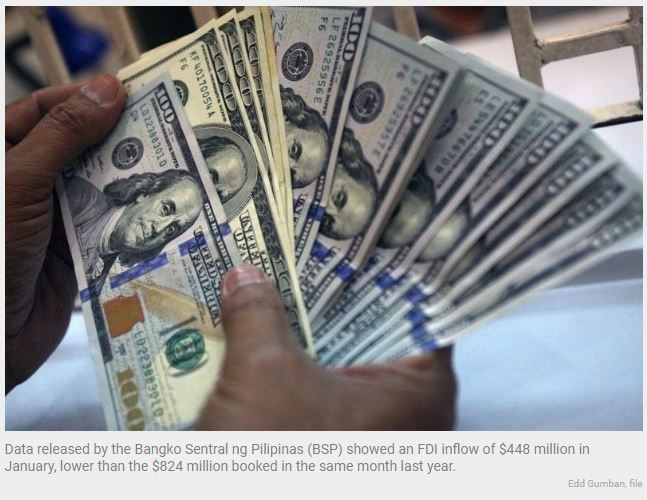Philippines: FDI inflow plunges 46% in January
MANILA, Philippines — The inflow of foreign direct investments (FDI) contracted for the third straight month after plunging by 45.7 percent in January amid global economic uncertainties and elevated inflation.
Data released by the Bangko Sentral ng Pilipinas (BSP) showed an FDI inflow of $448 million in January, lower than the $824 million booked in the same month last year.
“FDI net inflows declined during the month amid global economic uncertainties and high inflation, which continued to weigh on investor decisions,” the central bank said in a statement.
The amount of FDI flowing into the Philippines has been declining since November last year. The inflow in January was the lowest since the $426 million recorded in May 2021.
The series of aggressive rate hikes delivered by the US Federal Reserve and other central banks, including the BSP, to rein in inflation are expected to slow down the global economy.
Since it started its interest rate liftoff in May last year, the BSP’s Monetary Board has hiked key policy rates by a cumulative 425 basis points, bringing the benchmark rate to a 16-year high of 6.25 percent from an all-time low of two percent.
This, however, helped bring down inflation to a six-month low of 7.6 percent in March from 8.6 percent in February.
Despite the easing, the consumer price index averaged 8.3 percent in the first quarter of the year, well above the BSP’s two to four percent target range.
The BSP data showed that investments in debt instruments consisting mainly of intercompany borrowing between foreign direct investors and their subsidiaries or affiliates in the Philippines fell by 56.6 percent to $280 million in January from $645 million in the same month last year.
Likewise, total equity placements and investment fund shares slipped by 6.2 percent to $168 million.
Equity infusions from Japan, Singapore and the US jumped by 26.3 percent to $149 million in January. The inflows were channeled into manufacturing, real estate as well as financial and insurance.
On the other hand, equity withdrawals amounted to $56 million in January, five times the $11 million pulled out in the same month last year.
The BSP also reported a 4.1 percent increase in reinvestment of earnings to $75 million.
Michael Ricafort, chief economist at Rizal Commercial Banking Corp., said higher prices that fundamentally led to the rising trend in short-term interest rates and still relatively higher long-term interest rates both globally and locally as well as the risk of recession in the US dragged on FDI.
“For the coming months, net FDI could pick up as the economy reopened toward greater normalcy, Philippine economy still expected to have one of the fastest growth rates in the region, the country’s attractive demographics, economic reopening of China since December 2022, investment commitments obtained by the new administration from overseas trips in recent months,” Ricafort said.
Source: https://www.philstar.com/business/2023/04/12/2258169/fdi-inflow-plunges-46-january


 Thailand
Thailand




